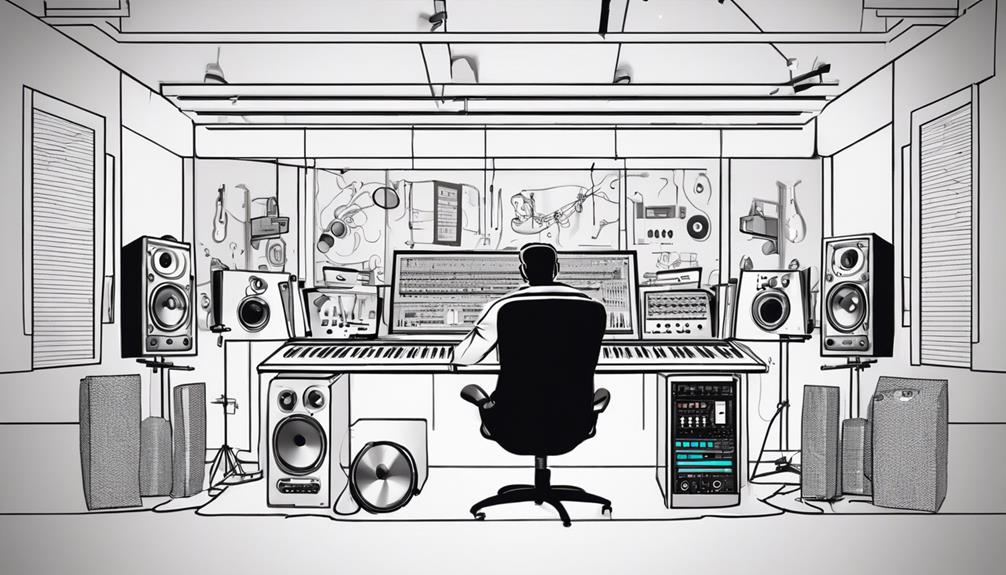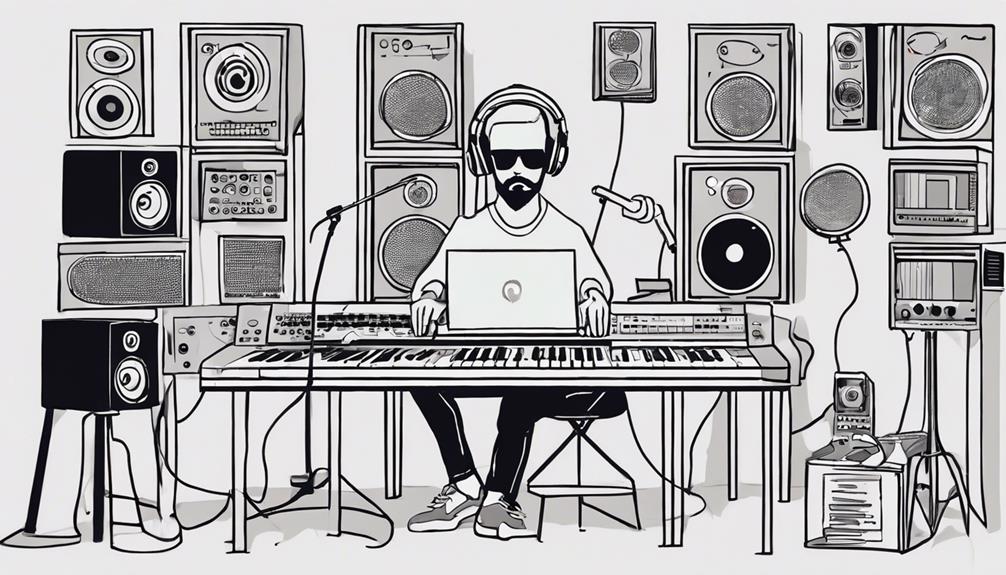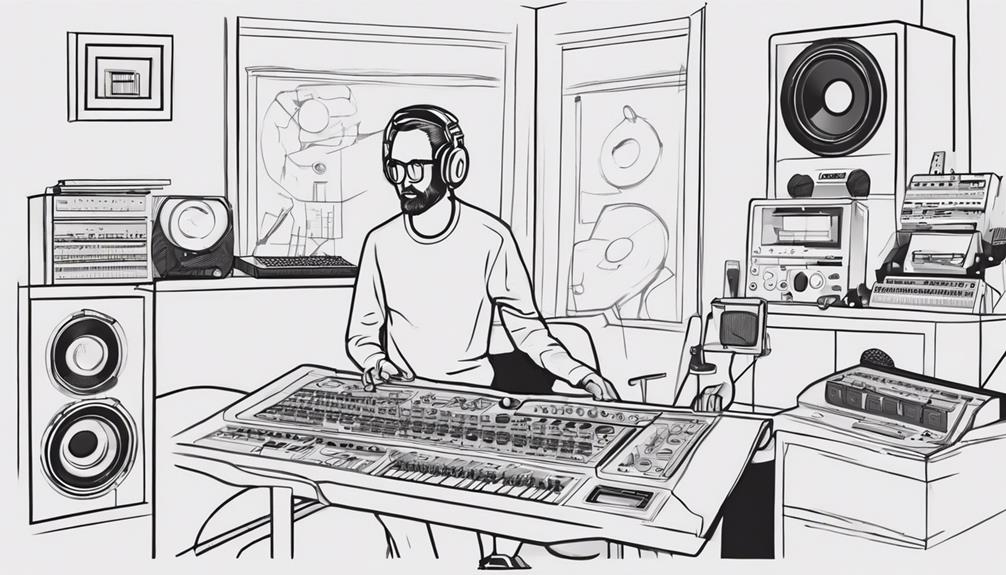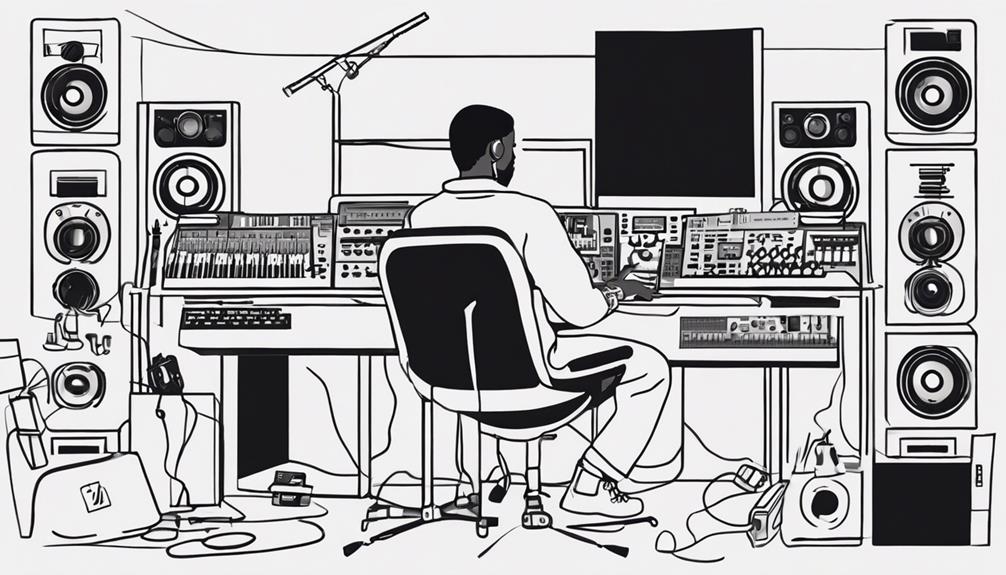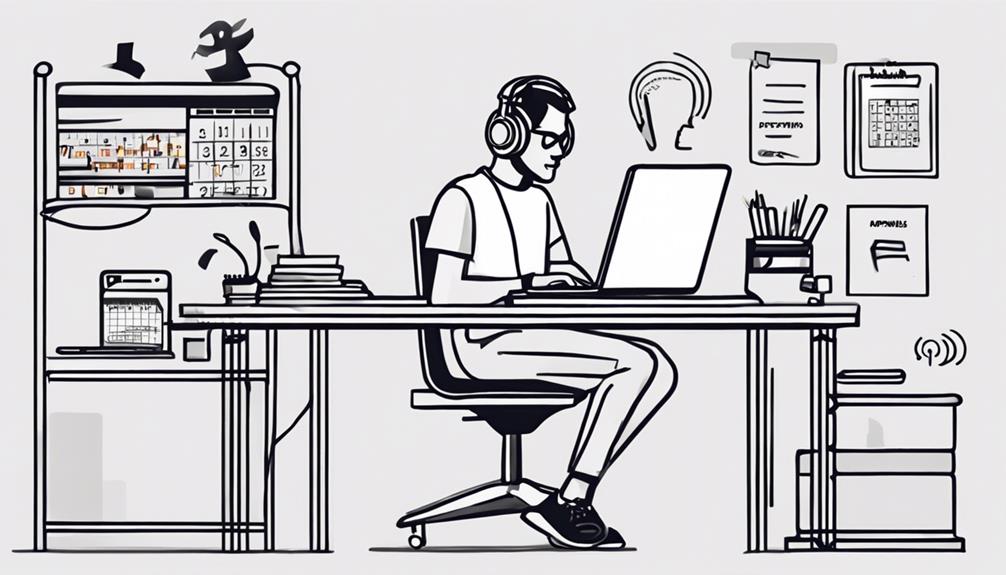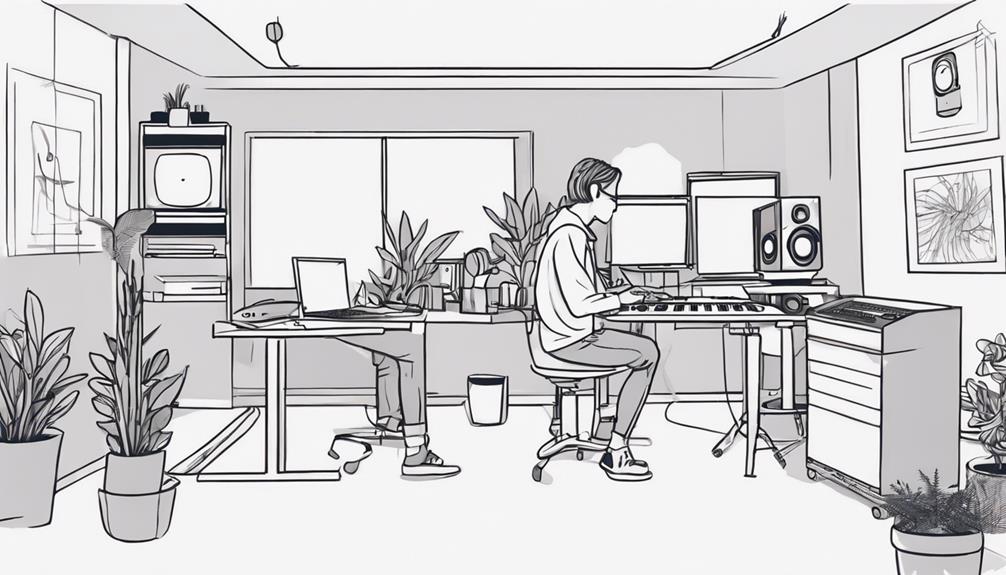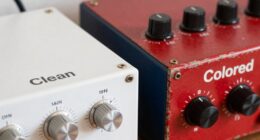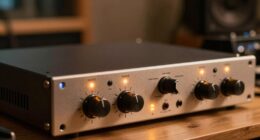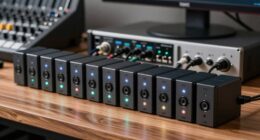To get a degree in Music Production, start by researching reputable programs. Look for accredited universities with industry connections. Explore specialized curriculum like audio engineering or music business. Meet admission requirements, prepare for auditions, and develop a portfolio if needed. Seek hands-on experience through internships and industry collaborations. Network with professionals for job prospects and industry insights. Enhance your skills through practical projects. By mastering these steps, you can pave the way for a successful career in music production.
Key Takeaways
- Research accredited universities with specialized music production programs.
- Look for hands-on experience in professional studio facilities.
- Consider faculty expertise, industry connections, and alumni success.
- Prepare for auditions, interviews, or portfolio submissions for admission.
- Network with professionals, attend events, and seek mentorship for career opportunities.
Research Reputable Music Production Programs
When researching reputable music production programs, focus on factors like accreditation, faculty expertise, and industry recognition.
Look for universities or colleges offering accredited degrees in music production or related fields like audio engineering. These programs can provide you with the necessary skills and knowledge to excel in the music industry. By choosing a well-recognized program, you increase your chances of securing career opportunities upon graduation.
Consider exploring specialized music production degrees that explore further into the technical aspects of audio production. Programs that offer hands-on experience in professional studio facilities can enhance your learning and prepare you for real-world scenarios.
Additionally, look into institutions with a strong network of industry connections and successful alumni, as these can open doors to potential job placements and collaborations in the future.
Explore Program Curriculum and Specializations
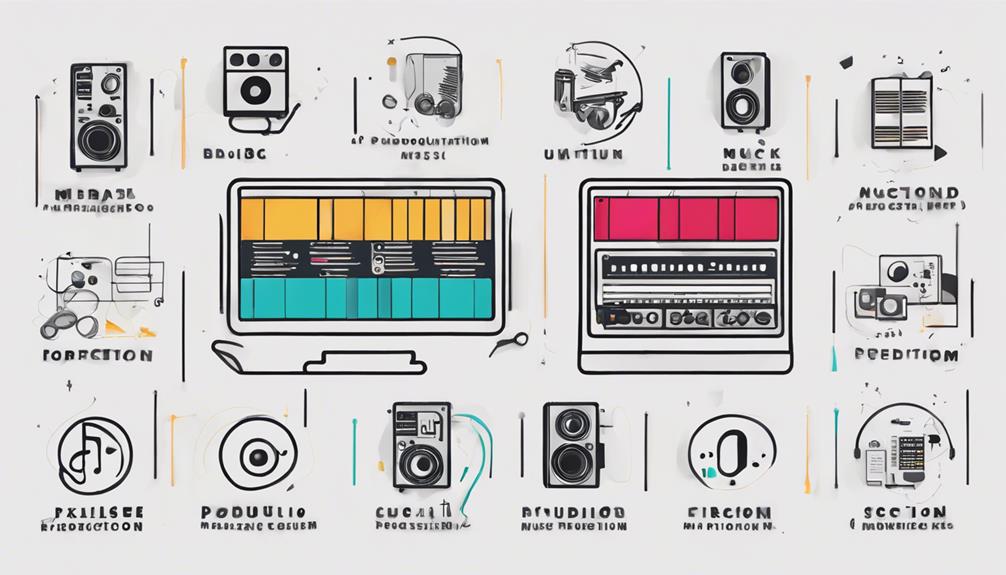
When exploring music production programs, you'll encounter a variety of courses covering music theory, DAWs, mixing, and mastering.
Specializing in areas like audio engineering, music business, or film scoring can provide a focused path within your degree.
Hands-on experience in recording studios and mixing labs will complement your theoretical knowledge.
Program Overview
Explore the varied program curriculum and specializations offered in music production degree programs. These programs cover a range of subjects including music theory, audio engineering, sound design, and music business. Students delve into studio recording techniques, MIDI programming, and digital audio editing to develop a well-rounded skill set.
One of the key highlights of these music production degree programs is the emphasis on hands-on experience. Through internships, studio projects, and collaborations with musicians, students gain practical exposure to the industry.
Furthermore, specializations within music production degrees allow students to focus on areas such as recording technology, post-production, live sound, and music composition. This tailored approach enables individuals to hone their expertise in specific fields of interest.
Graduates of music production programs are equipped to pursue diverse career paths as music producers, sound engineers, studio managers, or audio technicians. The extensive curriculum and specialized training offered in these programs prepare students for success in the dynamic field of music production.
Specialization Options
Exploring specialization options can provide you with focused training tailored to your career aspirations within a music production degree program. Music production degree programs offer various specializations to equip you with the specialization skills needed to succeed in the competitive music industry job market.
Here are three key points to explore when examining specialization options:
- Diverse Specializations: Programs often offer specializations in audio engineering, music business, composition, and sound design. Choosing a specialization aligned with your interests can help you build expertise in a specific area of music production.
- Tailored Education: Specializations like music technology, film scoring, or electronic music production provide customized education that can prepare you for different career paths within the music industry. These specialized tracks offer in-depth knowledge and hands-on experience to enhance your skills.
- Competitive Edge: By selecting a specialization, you can set yourself apart from the competition in the demanding music industry job market. Developing expertise in a specific area can make you a valuable asset to potential employers and help you thrive in your chosen career path.
Hands-On Experience
Hands-on experience is an integral component of music production degree programs. This allows you to develop practical skills through real-world projects and collaborations. In these programs, you'll have the opportunity to work in recording studios, honing your skills in music theory, audio engineering, sound design, mixing, mastering, and music business.
Specializations such as electronic music production, film scoring, or live sound production offer focused paths to explore within the field.
Internships and industry partnerships are key aspects of gaining hands-on experience. They provide you with real-world exposure and valuable networking opportunities. These opportunities allow you to apply your classroom knowledge in professional settings, preparing you for a successful career in music production.
Capstone projects or thesis requirements often culminate your degree. This enables you to showcase your acquired skills and expertise in a final project.
Embrace these practical experiences to enhance your learning and prepare for a dynamic career in the music industry.
Meet Admission Requirements for Applications

To gain admission to a music production degree program, you must make sure that you meet all specified admission requirements. Here are some key steps to keep in mind:
- High School Diploma: Most colleges and universities offering music production programs require applicants to have a high school diploma or an equivalent qualification. Make sure you meet this basic educational requirement before applying.
- Portfolio Showcasing: Some institutions may request a portfolio showcasing your musical work or prior experience in music production. Putting together a strong portfolio can greatly enhance your application and demonstrate your skills and passion for the field.
- Additional Criteria: Meeting minimum GPA requirements, submitting standardized test scores like the SAT or ACT, providing letters of recommendation, and possibly writing a personal statement outlining your interest in music production and career goals are common admission criteria.
Be prepared to fulfill any additional requirements such as auditions, interviews, or placement tests that may be necessary for admission to a music production program.
Seek Internship and Practical Experience Opportunities
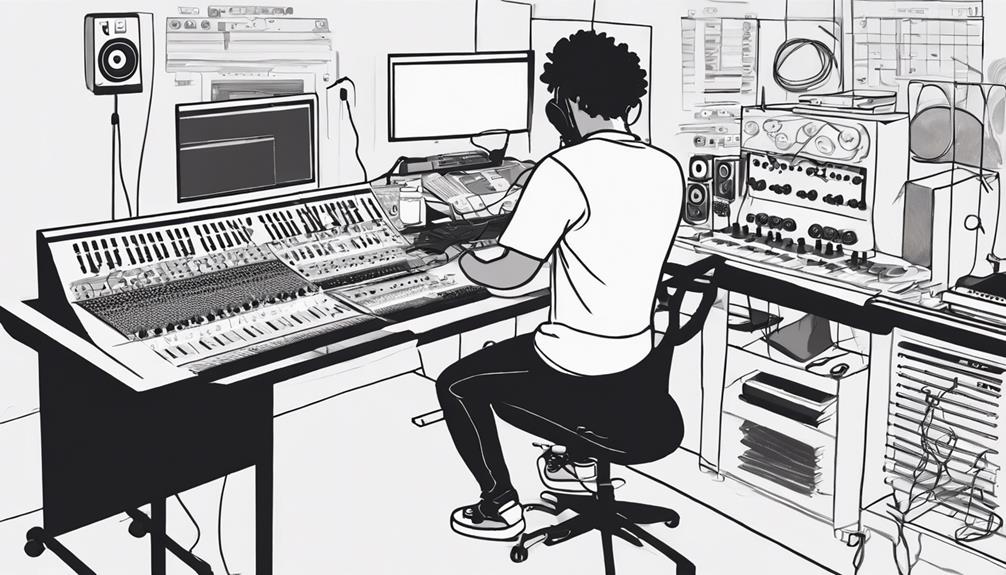
To complement your academic learning and enhance your skills in music production, actively seeking internship and practical experience opportunities is essential. Many music production degree programs mandate internships to provide hands-on training, networking opportunities, and exposure to real-world music production environments. These experiences not only help solidify your understanding of theoretical concepts but also allow you to build a strong portfolio to showcase your work. Exploring various music production internship tips, such as tailoring your resume to highlight relevant skills and researching potential companies, can significantly improve your chances of securing a valuable position. Additionally, maintaining a proactive and collaborative attitude during your internship can leave a lasting impression and open doors to future career opportunities in the industry.
These internships offer a chance to apply theoretical knowledge, develop technical skills, and create a professional portfolio. Typically, students intern at recording studios, music production companies, radio stations, or other industry settings relevant to their field of study.
Engaging in internship experiences can't only open doors to potential job opportunities but also help you establish valuable industry connections and gain insights into the music production field. As a result, make the most of these practical experiences to enhance your learning and kickstart your journey towards a successful career in music production.
Enhance Skills Through Hands-On Learning
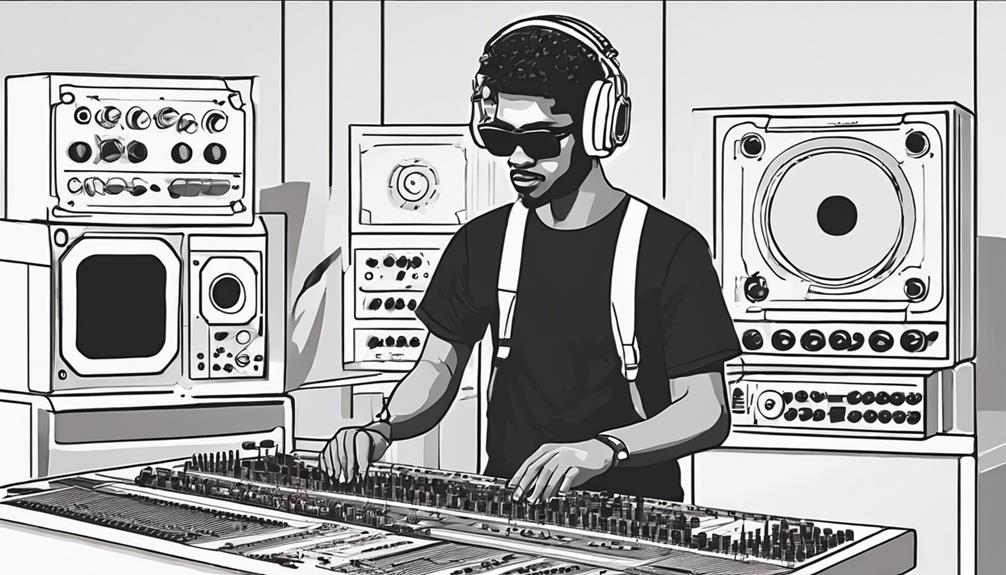
Enhance your music production skills through immersive learning experiences and practical application. Here are three ways to make the most out of hands-on learning in the field of music production:
- Participate in internships or apprenticeships:
Gain valuable practical experience by working in recording studios alongside professionals. This hands-on approach allows you to apply theoretical knowledge in real-world settings, honing your music production skills.
- Attend workshops and seminars by industry professionals:
Learn about the latest techniques and trends directly from experts in the field. These sessions provide valuable insights and practical tips that can enhance your music production abilities.
- Collaborate on music projects with peers:
Working with other students allows you to practice essential skills like teamwork and communication. By engaging in collaborative projects, you can learn from each other and experiment with different approaches to music production.
Connect With Industry Professionals for Networking
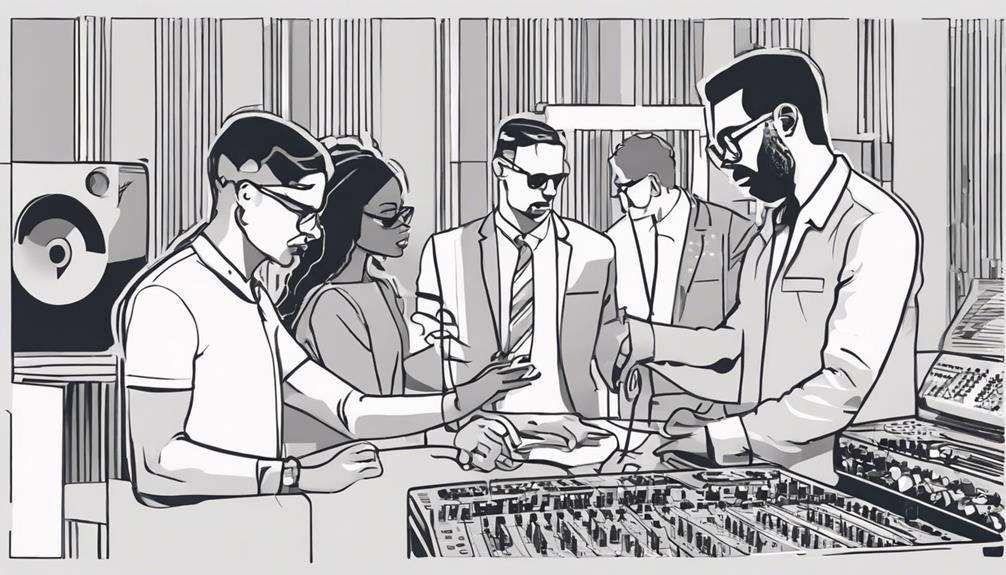
You need to understand the importance of networking with industry professionals in music production.
By strategically building relationships, you can navigate the music circles more effectively and open doors to valuable opportunities.
Making genuine connections and showing a sincere interest in the industry can lead to mentorship, collaborations, and potential career growth.
Industry Networking Importance
Connecting with industry professionals in music production can greatly enhance your career opportunities and growth. Networking with those already established in the field can provide valuable insights and open doors to internships, collaborations, and job placements.
Attending industry events, conferences, and workshops is a great way to meet music producers, engineers, and artists who can offer guidance and potential opportunities. Additionally, utilizing online platforms such as LinkedIn, SoundCloud, and music forums can help you build connections within the music production industry from the comfort of your own home.
Building Relationships Strategically
Attending industry events and workshops is a strategic way to establish connections with industry professionals in music production. These settings provide opportunities to network, learn from experts, and showcase your passion for the field. Additionally, utilizing social media platforms like LinkedIn can help you connect with professionals in a more informal setting, allowing for ongoing communication and relationship building. Seeking mentorship opportunities with experienced music producers can provide valuable insights and guidance as you navigate your career path. Collaborating on projects with established professionals not only expands your network but also allows you to showcase your skills and creativity in a real-world setting. Joining online communities and forums specific to music production is another way to engage with industry insiders, seek advice, and stay updated on the latest trends and opportunities.
| Building Relationships Strategies | Description |
|---|---|
| Attend Industry Events | Establish connections and network with industry professionals. |
| Utilize Social Media Platforms | Connect with professionals and build relationships online. |
| Seek Mentorship Opportunities | Gain insights and advice from experienced music producers. |
| Collaborate on Projects | Expand your network and showcase your skills through collaborations. |
| Join Online Communities | Engage with industry insiders, seek guidance, and stay updated. |
Navigating Music Circles
To successfully navigate music circles for networking in the music production industry, actively engage with industry professionals at events, conferences, and through online platforms. Here are three key strategies to help you connect with professionals and expand your network:
- Attend Industry Events:
Make an effort to attend music production conferences, workshops, and networking events where you can meet established professionals, exchange contacts, and learn about industry trends.
- Utilize Social Media:
Leverage platforms like LinkedIn, industry-specific forums, and social media groups to connect with professionals in the music production field. Engage in conversations, share your work, and seek advice from experienced individuals.
- Join Industry Organizations:
Consider becoming a member of industry organizations such as the Audio Engineering Society (AES) or the Music Producers Guild (MPG) to access exclusive networking opportunities, events, and resources to help you grow your connections within the industry.
Prepare for Graduation and Career Opportunities
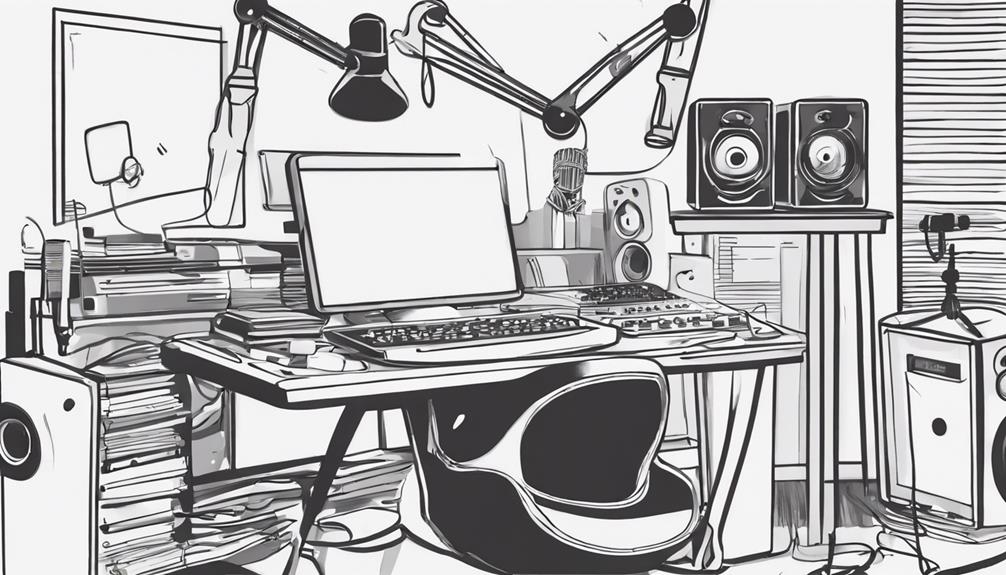
As you near the completion of your music production degree, it's essential to proactively prepare for graduation and explore potential career opportunities in the field. Make sure that the program you choose is accredited by reputable organizations like the National Association of Schools of Music (NASM) to guarantee a quality education.
Consider specializing in areas like audio engineering, sound design, or music business to align with your career goals and stay relevant in the industry. Look for schools with excellent facilities, industry connections, and internship opportunities to gain hands-on experience.
Moreover, researching financial aid options, scholarships, and grants can help ease the burden of tuition costs associated with pursuing a degree in music production. Additionally, networking with alumni, faculty, and industry professionals is important for enhancing your job prospects and staying informed about industry trends post-graduation.
Frequently Asked Questions
What Degree Should I Get for Music Production?
For music production, consider degrees like a Bachelor of Science in Music Production, Bachelor of Arts in Music with a concentration in Music Production, Bachelor of Music in Music Technology, or Bachelor of Arts in Audio Production.
How to Start a Career in Music Production?
To start a career in music production, focus on practical experience with a laptop and DAW. Demonstrate your skills through great music. Online resources and courses can help, but what matters most is showcasing your results and building a strong portfolio.
How Long Does It Take to Get a Music Production Degree?
Getting a music production degree typically takes 2 to 4 years, depending on the program and your study pace. Accelerated options may allow graduation in as little as 18 months. Online programs offer flexibility for students.
How Do You Get Recognized as a Music Producer?
To get recognized as a music producer, network with industry pros, showcase work on social media, collaborate with artists, submit music to platforms, and seek feedback for improvement. Building a strong presence and reputation is key.
Conclusion
So there you have it – you're well on your way to getting a degree in music production!
Remember, the early bird catches the worm, so start researching programs, meeting admission requirements, and seeking practical experience opportunities.
With dedication and hard work, you'll be on track to graduate and pursue exciting career opportunities in the music industry.
Keep pushing forward and chasing your dreams!

